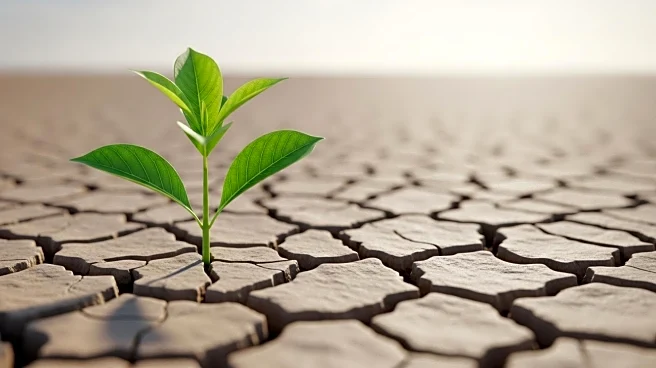What is the story about?
What's Happening?
The global food industry is grappling with sustainability challenges as climate change threatens crop production worldwide. Key agricultural regions, including cocoa farms in Ghana and Côte d’Ivoire, coffee plantations in Brazil and Vietnam, and corn fields in the US and Ukraine, are experiencing adverse weather conditions such as droughts, heatwaves, and storms. These environmental disruptions are impacting the bottom lines of major companies like Nestlé, which are witnessing sales declines due to consumer resistance to price hikes. The industry is facing skepticism towards sustainability initiatives, as businesses fear that green policies may harm competitiveness in the short term. This has led to a reluctance to adopt sustainability measures, despite the long-term risks posed by climate change.
Why It's Important?
The reluctance to embrace sustainability in the food industry has significant implications for both businesses and consumers. Unsustainable practices, such as deforestation, exacerbate climate change by destroying carbon sinks and releasing carbon dioxide, further intensifying environmental challenges. This vicious cycle threatens to reduce viable production areas globally, impacting soil health and crop yields. For consumers, the economic burden of rising food prices due to climate-related disruptions is a pressing concern. The industry's short-term focus on competitiveness over sustainability could lead to increased vulnerability to destructive weather events, affecting supply chains and investor confidence. Collaborative efforts are essential to mitigate these risks and ensure long-term stability.
What's Next?
The food and beverage industry must navigate the balance between competition and collaboration to address sustainability challenges effectively. While unilateral sustainability actions may pose risks, industry-wide cooperation is crucial to combat climate change and its impacts. Policymakers and businesses need to work together to implement sustainable practices that do not compromise competitiveness. As climate change continues to affect global agriculture, the industry must prioritize long-term resilience over short-term gains to prevent further environmental and economic damage.
Beyond the Headlines
The ethical dimension of sustainability in the food industry involves protecting Indigenous rights and ensuring equitable land use. As companies expand into new regions due to climate pressures, negotiations with Indigenous communities become vital to prevent exploitation and preserve cultural heritage. Additionally, the industry's approach to sustainability reflects broader societal attitudes towards environmental responsibility, highlighting the need for a cultural shift towards valuing long-term ecological health over immediate economic benefits.

















